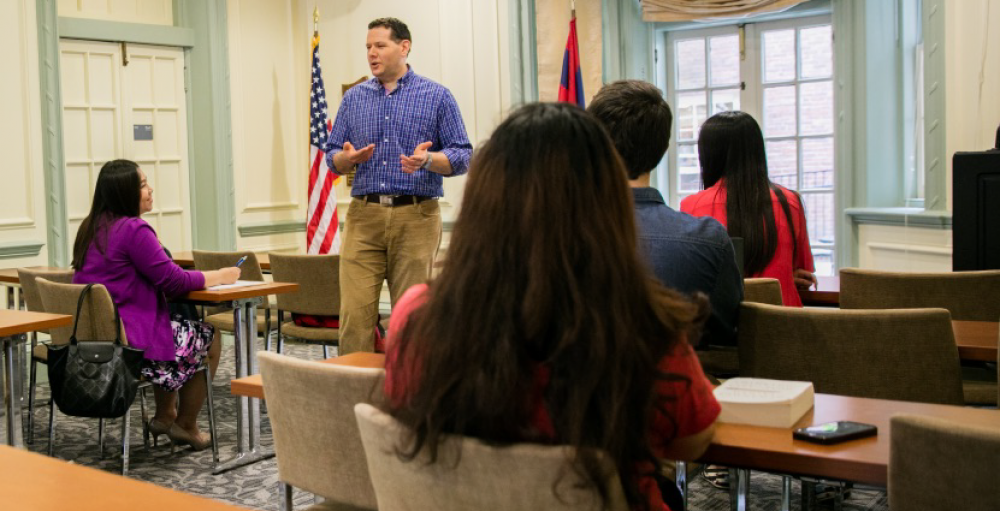2024:
Partisan Hostility and American Democracy: Explaining Political Divisions and When They Matter. Chicago: University of Chicago Press, Chicago Studies in American Politics (with James Druckman, Samara Klar, Yanna Krupnikov, and John Barry Ryan). | Website
Levendusky, M., Patterson, S., Margolis, M., Pasek, J., Winneg, K. and Jamieson, K.H. (2024). “Has the Supreme Court Become Just Another Political Branch? Public Perceptions of Court Approval and Legitimacy in a Post-Dobbs World.” Science Advances 10 (10): eadk9590 | Paper | Supplemental Material
Levendusky, M. (2024) “Can Information Persuade Rather than Polarize? A Review of Alex Coppock’s Persuasion in Parallel.” Political Science Quarterly 139(3): 435-44 | Review
Voelkel, J. et al. “Megastudy Testing 25 Treatments to Reduce Antidemocratic Attitudes and Partisan Animosity.” Science 386 (6719): https://doi.org/10.1126/science.adh4764 | Paper
Ahn, C., Lelkes, Y. and Levendusky, M. (2024). “Sanctioning Political Speech on Social Media Is Driven by Partisan Norms and Identity Signaling.” PNAS Nexus 3(12): pgae534. | Paper | Supplementary Materials | OSF Repository
Levendusky, M., Patterson, S., Margolis, M., Ophir, Y., Walter, D. and Jamieson, K.H. (2024). “The Long Shadow of the Big Lie: How Beliefs about the Legitimacy of the 2020 Election Spill Over onto Future Elections.” Public Opinion Quarterly 88(3): 933-61. | Paper | Supplementary Materials
Dias, N., J. Druckman, and M. Levendusky. (Accepted). “Unraveling a ‘Cancel Culture’ Dynamic: When, Why, and Which Americans Sanction Offensive Speech” Journal of Politics | Paper
_____________________________________________________________________________
2023:
Our Common Bonds: Using What Americans Share to Overcome the Partisan Divide. Chicago: University of Chicago Press, Chicago Studies in American Politics. | Website
Democracy Amid Crises: Polarization, Pandemic, Protest, and Persuasion. New York and Oxford: Oxford University Press (Annenberg Institutions of Democracy Collaborative). | Website
_____________________________________________________________________________
2022
Druckman, J., S. Klar, Y. Krupnikov, M. Levendusky and J.B. Ryan. (2022). “(Mis-)Estimating Affective Polarization.” Journal of Politics 84(2): 1106-17 | Paper | Supplemental Appendix
Grossman, G., Kronick, D., Levendusky, M. and Meredith, M. (2022). “The Majoritarian Threat to Liberal Democracy.” Journal of Experimental Political Science 9(1): 36-45. | Paper | Supplemental Appendix
Levendusky, M. (2022). “How Does Local TV News Change Viewers’ Attitudes? The Case of Sinclair Broadcasting.” Political Communication 39(1): 23-38. | Paper | Supplemental Appendix | Full Color Version of Figure 1
Lyons, B., et al. (2022). “Self-Affirmation and Identity-Driven Political Behavior.” Journal of Experimental Political Science 9(2): 225-40 | Paper
_____________________________________________________________________________
2021
Levendusky, M. and Stecula, D. (2021). We Need to Talk: How Cross-Party Dialogue Reduces Affective Polarization. Cambridge, UK: Cambridge University Press, Cambridge Elements in Experimental Political Science. | Publisher’s Website | Supplemental Appendix | USA Today Op-Ed
Druckman, J., S. Klar, Y. Krupnikov, M. Levendusky and J.B. Ryan. (2021). “How Affective Polarization Shapes Americans’ Political Beliefs: A Study of Responses to the COVID-19 Pandemic.” Journal of Experimental Political Science 8(3): 223 – 34. | Paper | Supplemental Appendix
Kingzette, J., Druckman, J., S. Klar, Y. Krupnikov, M. Levendusky and J.B. Ryan. (2021). “How Affective Polarization Undermines Support for Democratic Norms” Public Opinion Quarterly 85(2): 663-77. | Paper | Supplemental Appendix
Holbert, R.L., N. Dias, B. Hardy, K. H. Jamieson, M. Levendusky, A. Renninger, D. Romer, K. Winneg, and J. Pasek. (2021). “Exploring the Role of Media Use within an Integrated Behavioral Model (IBM) Approach to Vote Likelihood.” American Behavioral Scientist 65(3): 412-31. | Paper
Druckman, J., S. Klar, Y. Krupnikov, M. Levendusky and J.B. Ryan. (2021). “Affective Polarization, Local Contexts and Public Opinion in America.” Nature: Human Behaviour 5(1): 28-38. | Paper | Supplemental Appendix
_____________________________________________________________________________
2019
Druckman, J. and M. Levendusky. (2019). “What Do We Measure When We Measure Affective Polarization?” Public Opinion Quarterly 83(1): 114-22 | Paper | Supplemental Appendix
Iyengar, S., Y. Lelkes, M. Levendusky, N. Malhotra, and S. Westwood. (2019). “The Origins and Consequences of Affective Polarization in the United States.” Annual Review of Political Science 22(1): 129-46 | Paper
Druckman, J., S. Gubitz, M. Levendusky, and A. Lloyd (2019). “How Incivility On Partisan Media (De)Polarizes the Electorate.” Journal of Politics 81(1): 291-5 | Paper | Supplemental Appendix
_____________________________________________________________________________
2018
Levendusky, M. (2018). When Efforts to Depolarize the Electorate Fail. Public Opinion Quarterly 82(3): 583-92. | Paper | Supplemental Appendix
Levendusky, M. (2018). Americans, Not Partisans: Can Priming American National Identity Reduce Affective Polarization? Journal of Politics 80(1): 59-70. | Paper | Supplemental Appendix
McConnell, C., N. Malhotra, Y. Margalit, & M. Levendusky (2018). “The Economic Consequences of Partisanship in a Polarized Era.” American Journal of Political Science 62(1): 5-18. | Paper | Supplemental Appendix | Published Erratum | Detailed Erratum | Press Coverage
Druckman, J., M. Levendusky, & A. McLain. (2018). No Need to Watch: How the Effects of Partisan Media Can Spread via Inter-Personal Discussions. American Journal of Political Science. 62(1): 99-112. | Paper | Supplemental Appendix
_____________________________________________________________________________
2017
Levendusky, M. (2017). Morris Fiorina’s Foundational Contributions to the Study of Partisanship and Mass Polarization. The Forum 15(1): 189-201. | Paper
Levendusky, M. (2017). Partisan Media & Polarization: Challenges for Future Work. Oxford Research Encyclopedia of Politics., London, UK: Oxford University Press | Paper
_____________________________________________________________________________
2016

